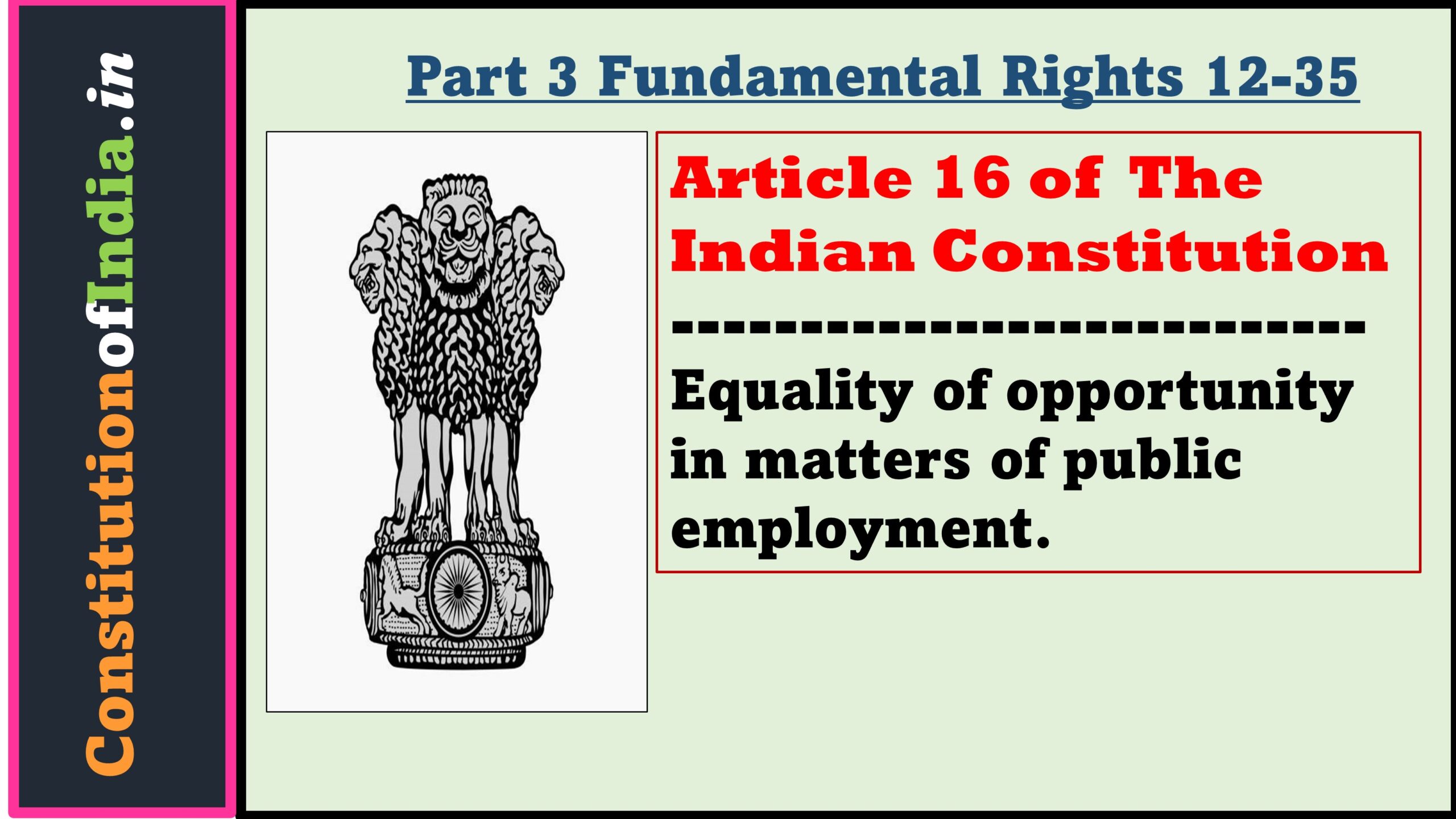Article 16 of Indian Constitution: Equality of opportunity in matters of public employment.

Article 16 Equality of opportunity in matters of public employment – Constitution of India
(1) There shall be equality of opportunity for all citizens in matters relating to employment or appointment to any office under the State.
(2) No citizen shall, on grounds only of religion, race, caste, sex, descent, place of birth, residence or any of them, be ineligible for, or discriminated against in respect of, any employment or office under the State.
(3) Nothing in this article shall prevent Parliament from making any law prescribing, in regard to a class or classes of employment or appointment to an office under the Government of, or any local or other authority within, a State or Union territory, any requirement as to residence within that State or Union territory] prior to such employment or appointment.
(4) Nothing in this article shall prevent the State from making any provision for the reservation of appointments or posts in favour of any backward class of citizens which, in the opinion of the State, is not adequately represented in the services under the State.
(4A) Nothing in this article shall prevent the State from making any provision for reservation 3 [in matters of promotion, with consequential seniority, to any class] or classes of posts in the services under the State in favour of the Scheduled Castes and the Scheduled Tribes which, in the opinion of the State, are not adequately represented in the services under the State.]
(4B) Nothing in this article shall prevent the State from considering any unfilled vacancies of a year which are reserved for being filled up in that year in accordance with any provision for reservation made under clause (4) or clause (4A) as a separate class of vacancies to be filled up in any succeeding year or years and such class of vacancies shall not be considered together with the vacancies of the year in which they are being filled up for determining the ceiling of fifty per cent. reservation on total number of vacancies of that year.]
(5) Nothing in this article shall affect the operation of any law which provides that the incumbent of an office in connection with the affairs of any religious or denominational institution or any member of the governing body thereof shall be a person professing a
particular religion or belonging to a particular denomination.
FAQs on Article 16 of the Indian Constitution
Q1: What is Article 16 of the Indian Constitution about?
A1: Article 16 of the Indian Constitution deals with the right to equality in matters of public employment.
Q2: What is the main objective of Article 16?
A2: The main objective of Article 16 is to ensure equality of opportunity in public employment and to prevent discrimination based on factors such as religion, race, caste, sex, descent, place of birth, or residence.
Q3: What does Article 16 guarantee regarding employment under the State?
A3: Article 16 guarantees equality of opportunity for all citizens in matters of employment or appointment to any office under the State.
Q4: Does Article 16 apply to all government jobs?
A4: Yes, Article 16 applies to all government jobs, whether in the central government, state governments, or any local or public authority.
Q5: Are there any exceptions to the right to equality in public employment under Article 16?
A5: Yes, Article 16 allows for certain exceptions or special provisions to be made for the advancement of socially and educationally backward classes, Scheduled Castes, Scheduled Tribes, and other underrepresented groups.
Q6: What are the specific provisions mentioned in Article 16 regarding reservations?
A6: Article 16(4) allows the State to make reservations in public employment for the aforementioned socially and educationally backward classes, Scheduled Castes, Scheduled Tribes, and other underrepresented groups.
Q7: Can reservations be made based on factors other than backwardness or underrepresentation?
A7: Article 16(4) permits reservations to be made based on factors such as backwardness, inadequacy of representation, and overall administrative efficiency.
Q8: Is there a maximum limit on reservations under Article 16?
A8: Yes, as per Article 16(4), reservations in public employment cannot exceed 50% except in certain exceptional circumstances.
Q9: Can the government relax age limits and other qualifications for reserved categories under Article 16?
A9: Yes, the government is allowed to relax age limits, educational qualifications, and other criteria for reserved categories as per Article 16(4) and 16(4A).
Q10: Can Article 16 be amended?
A10: Yes, Article 16 can be amended through the constitutional amendment process, which requires the approval of both houses of Parliament and ratification by the majority of state legislatures. However, any amendments should be consistent with the fundamental principles of equality and non-discrimination.